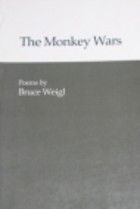Newman 1206.
From 1967 to 1970 Weigl served in the U.S. Army in Vietnam, and he received the Bronze Star.
"To be a writer," Bruce Weigl told Contemporary Authors (1984), "is to accept who you are, your background, the ruckus of your family life, the whole landscape of your past. For me it was steel mills and industrial waste. That's who I was and what I have to go on. If I'm lucky and work hard enough, I can turn the gritty language of an industrial city into poetry." While the urban landscape and family life certainly figure in Weigl's work, he is better known as one of the most eloquent poets to emerge from America's involvement in the Vietnam War. These subjects--Vietnam and family life in the industrial part of the United States--mirror and complement each other, giving Weigl's poetry its particular distinction and power.
Bruce Weigl was born on 27 January 1949 in Lorain, Ohio, to Albert Louis Weigl and Zora Grasa Weigl. He received his B.A. in English from Oberlin College in 1974, his M.A. in 1975 from the University of New Hampshire, and his Ph.D. in 1979 from the University of Utah, where he studied with poet Dave Smith . Weigl taught from 1975 to 1976 at Lorain County Community College in Elyria, Ohio, from 1979 to 1981 at the University of Arkansas at Little Rock, from 1981 to 1986 at Old Dominion University in Norfolk, Virginia (where he served as director of the Associated Writing Program), and after 1986 at Pennsylvania State University. From 1967 to 1970 Weigl served in the U.S. Army in Vietnam, and he received the Bronze Star. He has won some major literary prizes, including the Academy of American Poets Prize in 1979, Pushcart Prizes in 1980 and 1985, and a fellowship from the Bread Loaf Writers' Conference in 1981.
As an Ohio native, Weigl could not easily have escaped the influence of fellow Ohioan James Wright , and Wright's influence is evident throughout Weigl's work--particularly in the short, terse lines Weigl employs and in Weigl's emphasis on downtrodden characters and somber situations. The ironic title of Weigl's first full-length collection, A Romance (1979)--a book that includes work from his two previous chapbooks, A Sack Full of Old Quarrels (1976) and Executioner (1976)--is particularly fitting, since in literary tradition romance refers variously to medieval adventures of knights and heroes, to literature in which the emphases are on love and romance, and to the type of romance--such as some works of Nathaniel Hawthorne --in which atmosphere, chiaroscuro, and imagination are of particular importance. Such applications are ironic in Weigl's book, however, since the "knights" are Vietnam soldiers, the love is often the grim love between family members, and the imagination is used to create a disturbing, surreal atmosphere, a juxtaposition of Weigl's Vietnam experience with the world back home, each of which is a form of nightmare...
While Weigl has spent much of his time exorcizing the demons of Vietnam, his technical skill, voice, and sense of the universality of suffering indicate that he will be capable of rendering a broad, compelling body of poetry on other subjects. In the meantime, however, he has already contributed a distinguished service to American literature by giving voice to a war whose haunting images and memory refuse to go away. Since the end of the Vietnam War, the task of American historians, philosophers, writers, and artists has been to break down the war experience, to give it some sense of meaning in the overall context of national history. Weigl's poetry has been an important part of this process. As Walt Whitman expressed concepts of the Civil War, Wilfred Owen of World War I, and Randall Jarrell of World War II, so Weigl may be remembered as the voice of the Vietnam War. Like Owen's World War I soldiers, Weigl's Vietnam fighter is the prototypical modernist hero--who is trapped in a technological world, who is not quite an individual--fulfilling a role prescribed by larger powers that he neither understands nor has any control over, a role that only the longer scheme of history can place in its accurate context.
-- Jones, Roger D. "Bruce Weigl." American Poets Since World War II: Third Series. Ed. R. S. Gwynn. Dictionary of Literary Biography Vol. 120. Detroit: Gale Research, 1992. Literature Resource Center. Gale
